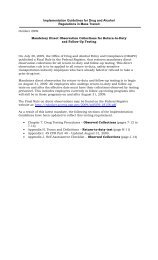What Employers Need To Know About DOT Drug and Alcohol Testing
What Employers Need To Know About DOT Drug and Alcohol Testing
What Employers Need To Know About DOT Drug and Alcohol Testing
Create successful ePaper yourself
Turn your PDF publications into a flip-book with our unique Google optimized e-Paper software.
Schedule<br />
Three Years<br />
Two Years<br />
One Year<br />
<strong>What</strong> <strong>Employers</strong> <strong>Need</strong> to <strong>Know</strong> <strong>About</strong> <strong>DOT</strong> <strong>Drug</strong> <strong>and</strong> <strong>Alcohol</strong> <strong>Testing</strong> – October 1, 2010<br />
31<br />
Type of Records<br />
Information obtained from previous employers under §40.25 concerning drug <strong>and</strong><br />
alcohol test results of employees.<br />
[Pipeline operators must keep supervisor <strong>and</strong> employee drug training records; <strong>and</strong><br />
records related to the drug collection process.]<br />
Records of the inspection, maintenance, <strong>and</strong> calibration of EBTs; <strong>and</strong><br />
Records related to the alcohol <strong>and</strong> drug collection process. These include, documents<br />
related to r<strong>and</strong>om selections, reasonable suspicion determinations, <strong>and</strong> post accident<br />
determinations; medical evaluations for insufficient amounts of urine <strong>and</strong> breath; <strong>and</strong><br />
supervisor <strong>and</strong> employee education <strong>and</strong> training records.<br />
[Motor carriers must keep supervisor, employee, BAT, <strong>and</strong> STT education <strong>and</strong><br />
training records for two years after the person ceases those specific functions.]<br />
[Railroads must keep records of negative <strong>and</strong> cancelled drug test results <strong>and</strong> alcohol<br />
test results with a concentration of less than 0.02 because of FRA regulations <strong>and</strong> must<br />
keep employee dispute records.]<br />
[Pipeline operators must keep supervisor <strong>and</strong> employer alcohol training records.]<br />
Records of negative <strong>and</strong> cancelled drug test results <strong>and</strong> alcohol test results with a<br />
concentration of less than 0.02.<br />
[Railroads must keep these records for two years.]<br />
Where <strong>and</strong> how should I keep my drug <strong>and</strong> alcohol testing records?<br />
You should keep testing records in locations with controlled<br />
access (for example, in locked cabinets <strong>and</strong> in rooms requiring<br />
access by sign in, lock <strong>and</strong> key or security code). Only<br />
employees with an official ―need to know‖ should have access to<br />
these records <strong>and</strong> be allowed in these areas. You can keep the<br />
records at your place of business or a service agent may keep<br />
them for you.<br />
MROs must keep their<br />
medical review records,<br />
their laboratory reports,<br />
<strong>and</strong> CCF copies they receive<br />
at their own business places.<br />
If you store your records electronically, you must make sure they<br />
are easily accessible, legible, formatted, <strong>and</strong> stored in an<br />
organized <strong>and</strong> reviewable manner. If electronic records do not meet these criteria, at the request of <strong>DOT</strong><br />
agency or USCG representatives, you must convert them to printed documentation in a rapid <strong>and</strong> readily<br />
auditable manner.
















